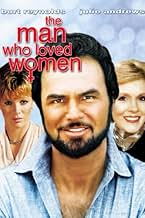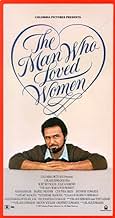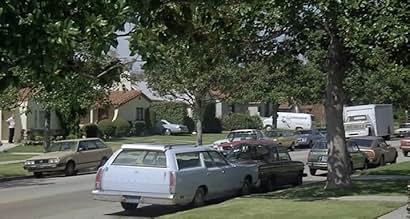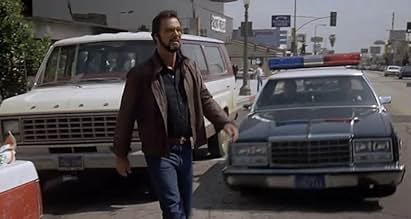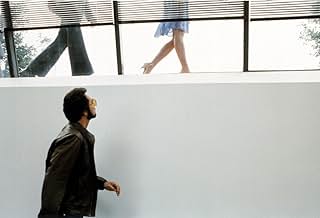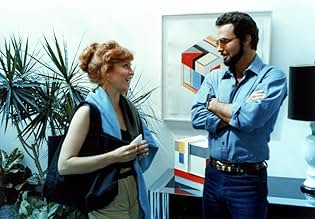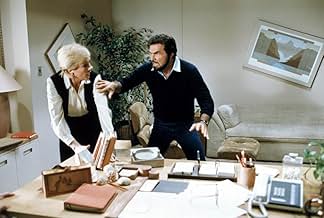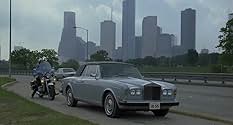VALUTAZIONE IMDb
5,3/10
2731
LA TUA VALUTAZIONE
Aggiungi una trama nella tua linguaA womanizing sculptor named David goes to seek help from a psychiatrist, Marianna, to cure him of his obsession with women.A womanizing sculptor named David goes to seek help from a psychiatrist, Marianna, to cure him of his obsession with women.A womanizing sculptor named David goes to seek help from a psychiatrist, Marianna, to cure him of his obsession with women.
- Regia
- Sceneggiatura
- Star
Cynthia Sikes Yorkin
- Courtney
- (as Cynthia Sikes)
Herb Tanney
- Doctor
- (as Schweitzer Tanney)
Recensioni in evidenza
Here is a picture that, for every conceivable reason, shouldn't work -- but on a purely emotional level, it does. Most viewers could be easily misled (and disappointed) by expecting a light romantic comedy or a wild sex farce. Instead, Blake Edwards and his co-screenwriters offer something entirely different, a picture far more complex, meaningful, and thought-provoking than what we might anticipate.
"The Man Who Loved Women" tells a sad, sad story about a middle-aged man (Burt Reynolds in one of his finest performances, as David Fowler) who drowns in isolation thanks to a rare ability: he's forced and driven, by instinct, to glimpse the sacredness and inner beauty of almost every woman he encounters. Yes, on some levels, his circumstances lead to a hedonistic paradise. But his feelings also prevent him from ever making a commitment, and isolate him from the joy of knowing one woman exclusively.
For that reason, a melancholic canopy hangs over the entire film and takes the front seat to humour. The story begins with David Fowler's death, and every event we witness onscreen is tinged by our knowledge that Fowler's obsession with women will eventually kill him. A slow, heavy, stringed theme song, Mancini's "Little Boys", plays softly throughout the film, and Fowler's words (in voice-over narration) constantly remind us of the deep, incurable loneliness that plagues him.
All of this might sound heavy-handed -- and it very well could be, if it weren't for the sexual fantasy and wild Edwards comedy that flesh out the story and provide relief. The melancholia and comedy work together, and Edwards achieves a delicate balance of mood --a bittersweet aura.
I've heard one criticism (see Ebert's review) that many of the story's psychological elements are impossible. Though a few scenes might suffer from exaggeration (hundreds and HUNDREDS of women attend David's funeral), one could easily dismiss the story -- as I did, at first --because so many male viewers *lack* Fowler's ability to care for women unconditionally; we want to believe that it's impossible for a contemporary Don Juan to exist. But that simply isn't tenable. My own theory about the film -- (and it's just a theory) -- is that Edwards may have pulled inspiration for Fowler from the late John Derek, another man worshipped and adored by women, who interacted with Edwards during the filming of "10" (1979).
Edwards and his co-writers lend a gentle touch to the film by crafting Fowler's character against-the-grain; while we might expect a narcissistic hedonist, he's just the opposite -- a warm, gentle, soul with only the sincerest motives. It's easy to understand why women are attracted to Fowler, from his first appearance onscreen. And, oddly -- male viewers may never begrudge Fowler his affairs, only applaud -- because his narration and his gentle spirit confirm the fact that he really does worship and adore everything about the girls who walk in and out of his life. "I keep thinking," he says sadly, "about all the women I'm never gonna know..."
In one of the film's most revealing and effective moments, Edwards allows us to glimpse a woman, at the funeral, who is the complete opposite of a "10" -- fat, homely, depressed -- undesirable. We have the distinct impression that her external appearance didn't matter to Fowler -- that he only looked into her heart and perceived her beauty. It lends credibility to psychologist Marianna's (Julie Andrews) observation: that David did, indeed, love all of the girls, equally and unconditionally.
"The Man Who Loved Women" tells a sad, sad story about a middle-aged man (Burt Reynolds in one of his finest performances, as David Fowler) who drowns in isolation thanks to a rare ability: he's forced and driven, by instinct, to glimpse the sacredness and inner beauty of almost every woman he encounters. Yes, on some levels, his circumstances lead to a hedonistic paradise. But his feelings also prevent him from ever making a commitment, and isolate him from the joy of knowing one woman exclusively.
For that reason, a melancholic canopy hangs over the entire film and takes the front seat to humour. The story begins with David Fowler's death, and every event we witness onscreen is tinged by our knowledge that Fowler's obsession with women will eventually kill him. A slow, heavy, stringed theme song, Mancini's "Little Boys", plays softly throughout the film, and Fowler's words (in voice-over narration) constantly remind us of the deep, incurable loneliness that plagues him.
All of this might sound heavy-handed -- and it very well could be, if it weren't for the sexual fantasy and wild Edwards comedy that flesh out the story and provide relief. The melancholia and comedy work together, and Edwards achieves a delicate balance of mood --a bittersweet aura.
I've heard one criticism (see Ebert's review) that many of the story's psychological elements are impossible. Though a few scenes might suffer from exaggeration (hundreds and HUNDREDS of women attend David's funeral), one could easily dismiss the story -- as I did, at first --because so many male viewers *lack* Fowler's ability to care for women unconditionally; we want to believe that it's impossible for a contemporary Don Juan to exist. But that simply isn't tenable. My own theory about the film -- (and it's just a theory) -- is that Edwards may have pulled inspiration for Fowler from the late John Derek, another man worshipped and adored by women, who interacted with Edwards during the filming of "10" (1979).
Edwards and his co-writers lend a gentle touch to the film by crafting Fowler's character against-the-grain; while we might expect a narcissistic hedonist, he's just the opposite -- a warm, gentle, soul with only the sincerest motives. It's easy to understand why women are attracted to Fowler, from his first appearance onscreen. And, oddly -- male viewers may never begrudge Fowler his affairs, only applaud -- because his narration and his gentle spirit confirm the fact that he really does worship and adore everything about the girls who walk in and out of his life. "I keep thinking," he says sadly, "about all the women I'm never gonna know..."
In one of the film's most revealing and effective moments, Edwards allows us to glimpse a woman, at the funeral, who is the complete opposite of a "10" -- fat, homely, depressed -- undesirable. We have the distinct impression that her external appearance didn't matter to Fowler -- that he only looked into her heart and perceived her beauty. It lends credibility to psychologist Marianna's (Julie Andrews) observation: that David did, indeed, love all of the girls, equally and unconditionally.
Seriocomic portrait of a middle-aged teenager. In the 1960s and 1970s, there were a slate of films about sensitive men who "loved" women. Sad attempts by so-called enlightened men to justify how their raging libidos were not at odds with them being feminists. They weren't womanizers, you see. They just loved women so much they couldn't stop at one. The Reese's peanut butter cups approach to adult relationships. Gene Siskel used to really love these types of films. It did not shock me to learn he gave this film three out of four stars.
This is a remake of a 70s film I haven't seen. It already feels like a relic by 1983. Blake Edwards, a director I've never been particularly enamored of outside of Breakfast at Tiffany's, can't seem to decide if we are to take this dreck seriously or not. The film introduces us to our horndog hero, played by Burt Reynolds who at this time was desperate to get away from success and achieve that which all box office stars seek eventually - "to be taken seriously as an AK-TOR!" What follows is an eyerollathon of good looking adults flirting with the finesse of children. There's sex, even some brief nudity from Marilu Henner, but the movie is never sexy. Nor is it fun. It certainly never approaches anything resembling funny. It's a slow, dry exercise in trying to provide sophistication and depth to Andy Hardy. Still, this is Burt before his mid-80s accident that he never fully recovered from. Whatever charms the movie has comes entirely from him.
This is a remake of a 70s film I haven't seen. It already feels like a relic by 1983. Blake Edwards, a director I've never been particularly enamored of outside of Breakfast at Tiffany's, can't seem to decide if we are to take this dreck seriously or not. The film introduces us to our horndog hero, played by Burt Reynolds who at this time was desperate to get away from success and achieve that which all box office stars seek eventually - "to be taken seriously as an AK-TOR!" What follows is an eyerollathon of good looking adults flirting with the finesse of children. There's sex, even some brief nudity from Marilu Henner, but the movie is never sexy. Nor is it fun. It certainly never approaches anything resembling funny. It's a slow, dry exercise in trying to provide sophistication and depth to Andy Hardy. Still, this is Burt before his mid-80s accident that he never fully recovered from. Whatever charms the movie has comes entirely from him.
Blake Edwards in the Sixties was an amazing director, with a strong visual flair. I mean he directed "Breakfast at Tiffany's", "Days of Wine and Roses", and "An Experiment in Terror"! But somewhere in all that Pink Panthering he did in the Seventies he lost that visual flair and became boring. The only film in the last thirty years that showed any of the old panache was "Victor/Victoria". It's like there are two Blake Edwards.
That's not to say that this film is terrible - it's just that I think he could have done so much better. It's so dull to look at - despite the presence of his enchanting wife Julie Andrews, and one of Burt Reynolds' best performances. Also of note is a very young Kim Basinger displaying a strong flair for comedy. But Edwards' pacing of the action is so slow and ponderous that the moments of slapstick comedy seem completely incongruous and fall completely flat.
Come on Blake - give us some more of that old magic! I know it's still in you.
That's not to say that this film is terrible - it's just that I think he could have done so much better. It's so dull to look at - despite the presence of his enchanting wife Julie Andrews, and one of Burt Reynolds' best performances. Also of note is a very young Kim Basinger displaying a strong flair for comedy. But Edwards' pacing of the action is so slow and ponderous that the moments of slapstick comedy seem completely incongruous and fall completely flat.
Come on Blake - give us some more of that old magic! I know it's still in you.
I just saw The Man Who Loved Women, and I found it to be a rather delightful movie. It's a plot you don't see to often; it's focused on one man and his love of women. The movie may seem pointless, but you'll get it once you see the ending. I won't ruin it here, but it was kind of depressing and unexpected, and looking back on the movie, I enjoyed it much more afterwards than during. It's not the most exciting movie. You won't see any amazing or dynamic cinematography or camera angles that are all to creative. In fact, it seems more like a movie from the '70's than 1983 in the way it was filmed, but if you like the kind of movies that you enjoy much more after having looked back on everything, I think you'll find this a rather enjoyable work.
There are two movies reported to have been what Burt Reynolds decided to star in instead of co-starring in TERMS OF ENDEARMENT for the role famously taken by Jack Nicholson... and along with being box office bombs, they embodied each sub-genre that rode Burt through six-years as box office king...
The second is the action-comedy STROKER ACE directed by collaborator/stuntman muse Hal Needham; and the first by a director Burt's said to have liked the best, Blake Edwards, in the romantic-comedy THE MAN WHO LOVED WOMEN...
Which is a far better vehicle for Reynolds, herein playing it safely and naturally as a doomed sculptor who, as we begin, has a myriad of women attending his funeral that, narrated by sophisticated shrink and ultimate love-interest (and the director's wife) Julie Andrews, keeps the viewer guessing on how he'll eventually buy the farm...
As that too is ultimately humorous while MAN rolls around dryly and coolly... without any big laughs... in that slow-burn fashion of Blake's game-changing 10: both depicting a wealthy mid-life-crisis-struck artist with everything who still complains about having too much... of everything...
But it's the WOMEN who are the most intriguing... not only to gander at but to anticipate... ranging from extremely sexual married-Texan Kim Basinger, lovely-legged Marilu Henner, down-home Cynthia Sikes, 11th hour groupie Sela Ward while the cutest is the most subtle in Edwards' daughter Jennifer as a hooker turned secretary...
Overall making this Americanized 1970's-French-remake seem from that very decade of good-old-fashion jazz-soaked womanizing through dry self deprecation that surely suits Burt -- despite being on cruise control throughout.
The second is the action-comedy STROKER ACE directed by collaborator/stuntman muse Hal Needham; and the first by a director Burt's said to have liked the best, Blake Edwards, in the romantic-comedy THE MAN WHO LOVED WOMEN...
Which is a far better vehicle for Reynolds, herein playing it safely and naturally as a doomed sculptor who, as we begin, has a myriad of women attending his funeral that, narrated by sophisticated shrink and ultimate love-interest (and the director's wife) Julie Andrews, keeps the viewer guessing on how he'll eventually buy the farm...
As that too is ultimately humorous while MAN rolls around dryly and coolly... without any big laughs... in that slow-burn fashion of Blake's game-changing 10: both depicting a wealthy mid-life-crisis-struck artist with everything who still complains about having too much... of everything...
But it's the WOMEN who are the most intriguing... not only to gander at but to anticipate... ranging from extremely sexual married-Texan Kim Basinger, lovely-legged Marilu Henner, down-home Cynthia Sikes, 11th hour groupie Sela Ward while the cutest is the most subtle in Edwards' daughter Jennifer as a hooker turned secretary...
Overall making this Americanized 1970's-French-remake seem from that very decade of good-old-fashion jazz-soaked womanizing through dry self deprecation that surely suits Burt -- despite being on cruise control throughout.
Lo sapevi?
- QuizThis movie, a remake, was released six years after François Truffaut's source French movie L'uomo che amava le donne (1977).
- BlooperWhen Julie Andrews unwraps the book on the plane, the front cover is visible before she flips it over to face her, but then when it is shown from her point of view, it looks completely different.
- Citazioni
Agnes Chapman: You're a fast worker. I better leave before one of us gets pregnant.
David Fowler: I'm not that fast.
- Colonne sonoreLittle Boys (theme song)
Music by Henry Mancini
Lyrics by Alan Bergman & Marilyn Bergman
[Played over the closing credits]
Performed by Helen Reddy
I più visti
Accedi per valutare e creare un elenco di titoli salvati per ottenere consigli personalizzati
- How long is The Man Who Loved Women?Powered by Alexa
Dettagli
- Data di uscita
- Paese di origine
- Sito ufficiale
- Lingue
- Celebre anche come
- The Man Who Loved Women
- Luoghi delle riprese
- Houston, Texas, Stati Uniti(Texas scenes.)
- Aziende produttrici
- Vedi altri crediti dell’azienda su IMDbPro
Botteghino
- Budget
- 12.000.000 USD (previsto)
- Lordo Stati Uniti e Canada
- 10.964.740 USD
- Fine settimana di apertura Stati Uniti e Canada
- 1.347.032 USD
- 18 dic 1983
- Lordo in tutto il mondo
- 10.964.740 USD
- Tempo di esecuzione
- 1h 50min(110 min)
- Mix di suoni
- Proporzioni
- 1.85 : 1
Contribuisci a questa pagina
Suggerisci una modifica o aggiungi i contenuti mancanti


